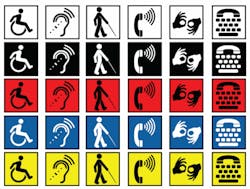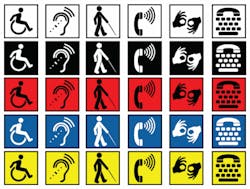Not like old times
Treating and understanding the geriatric patient
by Jane Weiner, RDH
Geriatrics: a branch of medicine that deals with the problems and diseases of old age and aging people.
Gerontology: the comprehensive study of aging and the problems of the aged.
When I turned 65, all I was looking for was my Medicare card to be in the mail. How exciting! But when I heard that I was now considered a geriatric, I was shocked, and how it threw me for a loss of words.
I do not think I look like I am an individual who has entered "old age," nor do I feel like a person who has entered "old age."
Having worked as a dental hygienist in a primarily "geriatric practice" for over 15 years, though, I have come to the realization that many people in the age range of 65 and over do need special attention in many ways.
One that comes to mind vividly is that of the different medical conditions that elderly patients face. In every new decade of life, we do face various challenges, and the geriatric patient faces so many more than before in their life.
Many now have been diagnosed with hypertension, other cardiovascular diseases, diabetes, Parkinson's and Alzheimer's diseases, and rheumatoid arthritis among other conditions.
Many have lost spouses and are living alone for the first time in many years, facing those daily challenges.
Many are debilitated in one way or another and now need care by a caregiver.
All of these conditions take their toll on our patients. As professional health-care providers, we do treat the entire person, not just the teeth in the oral cavity.
How many times has an aging patient come in on their three-month recall and really just needed to chat? It happens very frequently. The "chat" is almost as important, if not more so, than the prophylaxis. The patient could just be lonesome or all of a sudden is the caregiver to someone else and finds it overwhelming. They may need to vent or just spend time away from their responsibilities without feeling guilty. It becomes our job to be understanding of this and to be there for the person as a person as well as a patient.
When a patient presents with hypertension or cardiac problems, obtain exactly what medications they are taking and understand the limitations that these medications place on the patient (and the practitioner). Many of these patients cannot lay back in the chair as far as they formerly reclined. The dentist would no longer use a local anesthetic with epinephrine (or if he/she did, then it would have to be a .04 % epinephrine anesthetic).
There are many oral ramifications or complications. Some of the calcium channel blockers (nifedipine [Procardia], Dilacor, Cardizem) can cause gingival hyperplasia. Some beta blockers (atenolol [Tenormin], propanolol [Inderal], and some ace inhibitors (enalapril [Vasotec]) can cause the patient to appear to have bradycardia (a very low pulse rate), yet it would be normal.
Many patients on HTN medications need to wait for a two-minute period before being released from the dental chair. If they get up too quickly, they tend to have postural hypotension (orthostatic hypotension), and this can create a problem not only for the patient but for the practitioner.
We just need to be aware of the patient's needs and that they know that we care. Who would want to tell a patient that they have gingivitis, treating them accordingly and noting that it just does not disappear even with good home care – only to find out that it is medicinally caused? In such cases, we have to help the patient adjust by thinking outside of the box with home-care instructions.
Diabetes, rheumatoid arthritis, Parkinson's disease
Another condition that many geriatrics face is diabetes. Although diabetes spreads across several age generations, the diabetic geriatric patient needs to be treated a bit differently. They know that they have it. They know that they take their medication, and they also know that they take four or five other medications as well. We need to acknowledge that the diabetic patient heals slower than the patient without diabetes, taking that into account when assessing treatment outcomes.
We also need to treat a diabetic soon after they've eaten and taken medication. For years, we have been taught that one must treat a diabetic as soon as after a meal and taking medication. Many medications currently have a longer peaking period, so we need to know about the patient's specific medication.
But they must have eaten. This is imperative. We also need to keep a sugar substitute on hand in the office in case the patient does have a hypoglycemic episode.
We also need to realize that there might be more bleeding with this patient, more calculus, and we need to address the recall (recare) interval more closely.
Another frequent condition seen in the geriatric patients is rheumatoid arthritis. This is a most frustrating and sometimes a debilitating condition for the patient. They have discomfort, loss of function of their hands and fingers (frequently), and many other side effects. They are put on one or several of many different types of medications that also have many side effects.
Xerostomia is common in patients with rheumatoid arthritis. They frequently are prone to this side effect of their medications, or they have developed Sjögren's syndrome and find that they now have dry eyes, nasal areas, and, most annoyingly, xerostomia. Although most products will not help the patient with the dryness, we can suggest different approaches. At least psychologically, the patient knows that we care and are trying to be of assistance. But we must always be honest and tell them that we do not know if a product will help.
Caries risk assessment with the rheumatoid arthritis patient remains important due to the effects of xerostomia. We need to watch for the very beginning of root caries in particular and recommend the type of fluoride that will be most beneficial to this patient.
We also need to help the patient choose the correct toothbrush. If the rheumatoid arthritis has affected their ability to brush well with a manual brush, determine which of the power toothbrushes are easier to handle. Take into consideration the size of the handle, since a larger handle might be easier for them to grasp.
Treating patients with Parkinson's can be very stressful for both the patient and the provider. These patients have a disease that goes through stages. Although they might have a blank stare, this does not mean that they do not understand us (as with the Alzheimer patient).
We need to be sure to talk to the Parkinsonian patient, not at them, and to understand their shortcomings and any disability that they might be facing. These patients also will often need help from us in choosing the correct toothbrush for them or adapting the one that they have.
With my father, I used Velcro to help him with holding his toothbrush. His tremors almost made it like a power toothbrush (and today we have so many options from which to choose).
We need to also watch this patient for signs of xerostomia and, of course, be on top of caries risk assessment.
Most of all, we need to do all of this for each of our geriatric patients – with the utmost of respect. We must bear in mind the cost of what we recommend (most will be on a fixed income), and we need to not cause alarm to these patients. Most everything is treatable and controllable. It is our job and privilege to be the one to help this type of patient not feel "old" but to feel that they are important, that we care, and that they are capable of caring for themselves.
It is fine to include the caregiver because, at some point in time, they will probably need to help the patient. But please always remember to talk to the patient.
Finally, remember to keep a sense of humor with the geriatric patient. They know better than we that "growing old is inevitable, growing up is optional." They appreciate how we care. I know that we all are very knowledgeable but remember that very few care how much we know until they know how much we care.
Jane Weiner, RDH, is an Informatics Assistant at Nova Southeastern University College of Dental Medicine, in Ft. Lauderdale, Fla. She is also the owner of Jane Weiner, RDH, Board Reviews, Inc.
References
www.informationaboutdiabetes.com
Past RDH Issues

